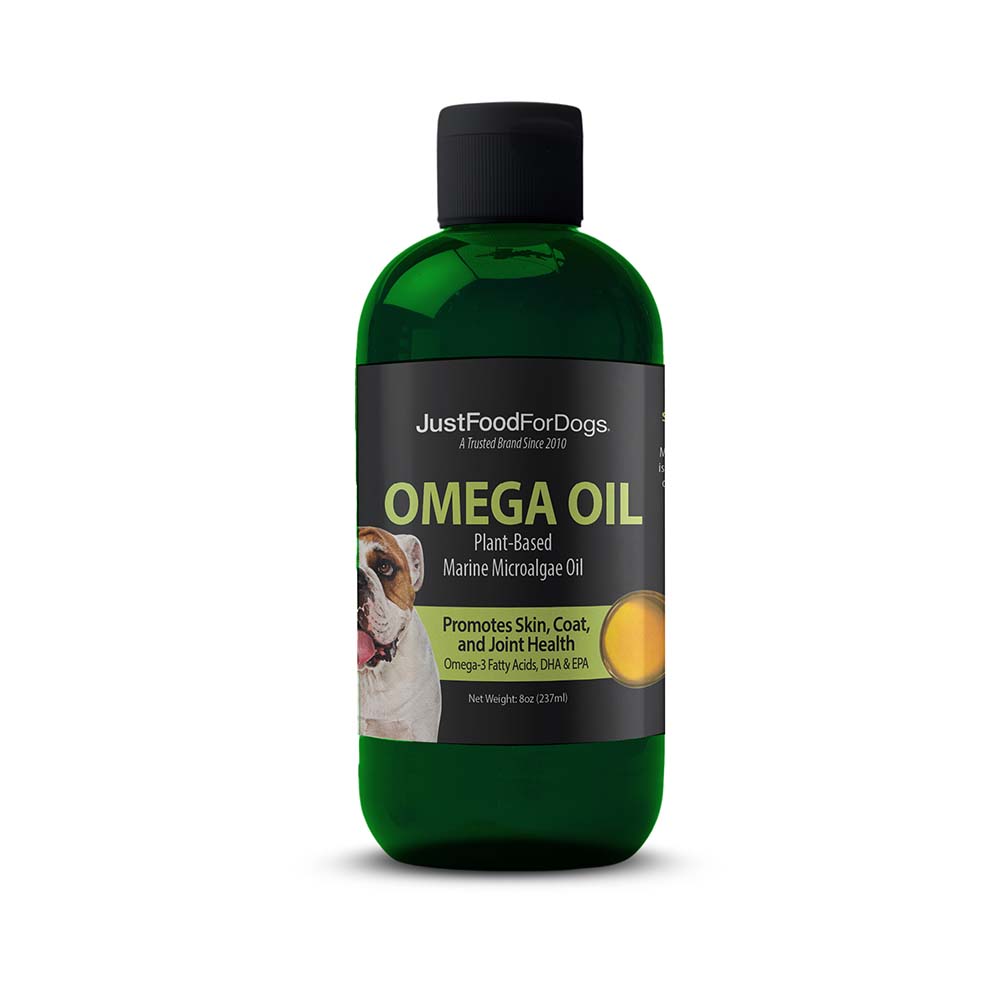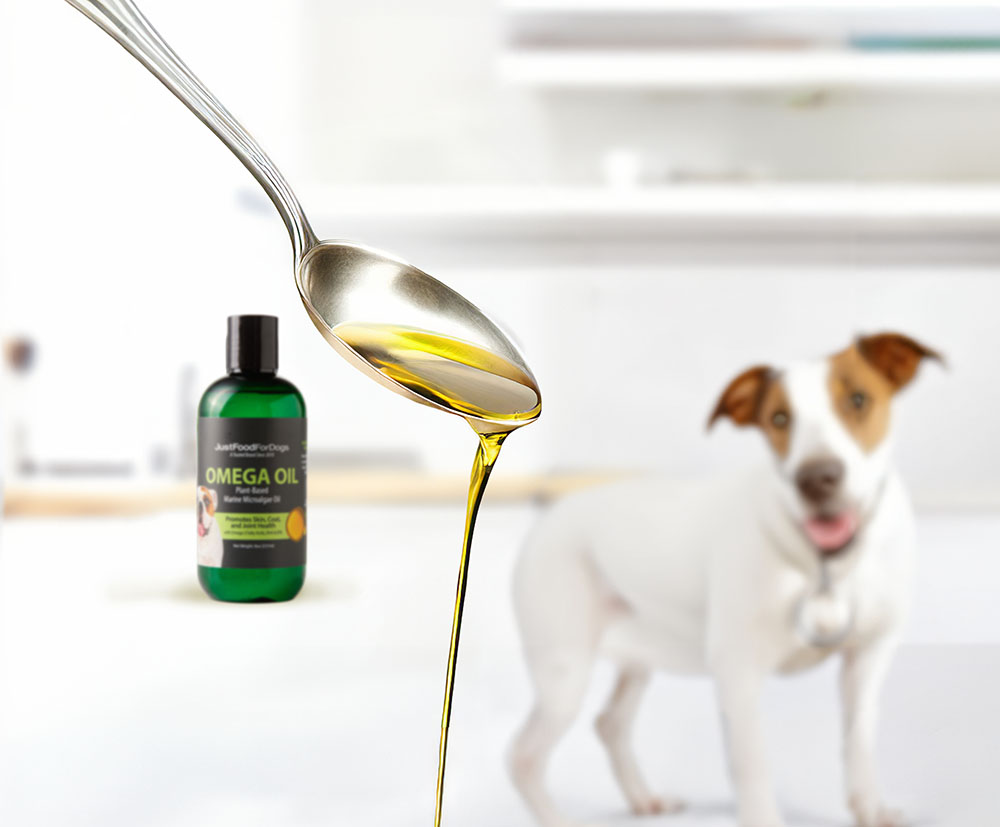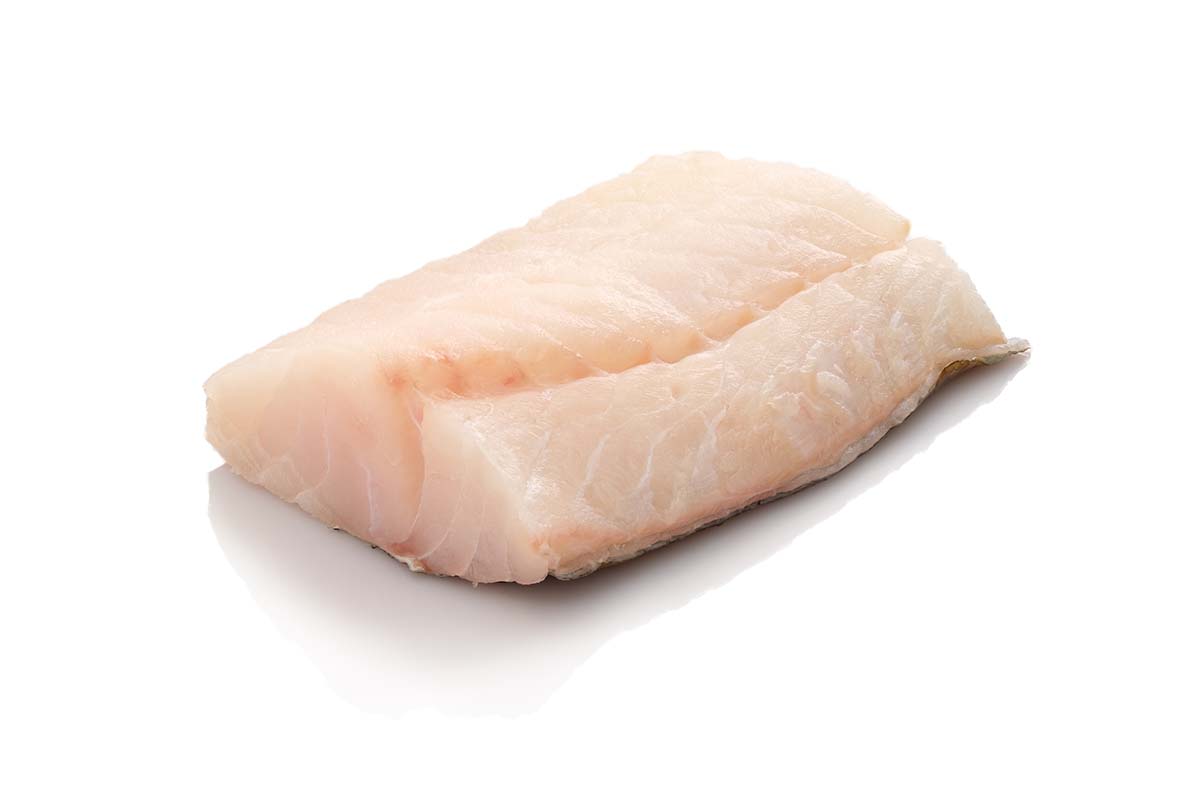5 Benefits of Omega-3 Fatty Acids for Dogs
Omega-3 fatty acids for dogs possess all kinds of benefits that are vital to their overall health.
What do you consider essential? For some, it might be that morning cup of coffee. For your dog, it might be a beloved chew toy. In reality, few things are as vital to our daily lives as essential nutrients. Among the most important for both humans and pets are Omega-3 fatty acids.
If you’ve ever taken a fish oil supplement or fortified vitamin, you’ve probably heard of this crucial nutrient. But what about your dog? According to Dr. Jessica Wilson, DVM, omega-3 fatty acids are just as important when it comes to protecting the health of our canine companions.
But how do you ensure your dog is getting enough of this real-life essential? And when is it necessary to supplement? Here’s a helpful guide covering everything you need to know about all-important Omega-3 fatty acids for dogs.
WHAT ARE OMEGA-3 FATTY ACIDS?

In a nutshell, Omega-3s are polyunsaturated fats — a type of healthy fat found in animal- and plant-based ingredients. There are three types of Omega-3 fatty acids:
- eicosapentaenoic acids (EPA)
- docosahexaenoic acids (DHA)
- alpha-linolenic acids (ALA)
EPA and DHA come from algae and fish, whereas ALA comes from plants.
Omega-3 fatty acids support just about every part of your dog’s body function properly, including:
- eyes
- brain
- skin & coat
- heart
- lungs
- immune system
- endocrine system
That’s not the only reason these fatty acids are so vital. Dogs are incapable of producing them on their own. As a result, their diet must supply all the essential fatty acids your dog needs to survive. And that requires more than just the right amount of nutrients.
According to Dr. Wilson, ensuring that your pet’s diet is nutritionally balanced is key. For example, Omega-6 fatty acids (found in nuts, seeds, and vegetable oils) are also important for your dog’s health. However, if you overdo it on Omega-6s, you could cancel out the benefits of Omega-3s.
In proper balance, these fatty acids work as a team to keep your dog’s body running smoothly. “Omega-6s help trigger inflammation, which is important when your body needs to address an irritant or injury, “ says Dr. Wilson. “Omega-3s direct the body when to calm down that inflammation.”
Excessive amounts of Omega-6 can suppress the anti-inflammatory properties of Omega-3 fatty acids, leading to chronic and potentially damaging inflammation.
5 Health Benefits of Omega-3s

Inflammation may not sound all that dangerous. But it may be linked to other, more serious health issues, which is why Omega-3s are so important to your pet. Here are the top five ways that a diet rich in Omega-3 fatty acids may benefit your dog:
1. Promote heart health
According to Dr. Wilson, Omega-3 fatty acids are the key to cardiac health:
“Omega-3s have antioxidant benefits that reduce the burden on the heart,” she says. In dogs with heart disease, Omega-3s help:
- maintain a healthy inflammatory response
- support normal blood pressure
- support normal cardiac function
Omega-3s may also stabilize irregular heartbeat (called cardiac arrhythmia).
If you choose to supplement your dog’s diet, algae oil is preferable to flaxseed oil for dogs with heart disease because it provides more accessible Omega-3 fatty acids. Dr. Wilson suggests you consult your veterinarian or a veterinary cardiologist to confirm your dog is getting the right dose and form of Omega-3s to fit their health profile.
2. Bolster healthy brain function
Dogs depend on Omega-3 fatty acids to support cognitive function and development. Dr. Wilson notes that the nutrient is especially important for puppies, explaining, “Puppies need extra EPA and DHA in their diets. There are certain levels that have to be maintained for proper brain function and development.”
Omega-3s may also help support older dogs diagnosed with Canine Cognitive Disorder (CCD). CCD is a type of “doggie dementia” that causes confusion, memory lapses, agitation, and other signs of age-related cognitive decline. One study found that senior dogs with high levels of Omega-3 fatty acids in their blood experienced reduced cognitive decline.
3. Regulate the immune system
Omega-3s are touted for the role they play in maintaining a healthy immune response thanks to properties that support a healthy inflammatory response. When the immune system senses a threat, it triggers inflammation as a way to isolate and destroy the dangerous invader.
However, that powerful response can also damage healthy cells if left unchecked. EPA and DHA block some of the pathways that allow inflammation to spread to healthy cells.
There’s even new evidence that Omega-3s may do more than just support a healthy immune response. Research suggests that they may also enhance the activity of infection-fighting white blood cells.
4. Support a healthy inflammatory response
EPA and DHA may help support a healthy inflammatory response, which is good news for dogs with osteoarthritis, cancer, and autoimmune diseases.
Omega 3s are great for supporting joint health. Research shows that dogs with osteoarthritis that received a fish oil supplement for three months experienced lower levels of joint pain, lameness, and joint diseases, compared to dogs that receive mineral oil.
5. Improve skin and coat
Feeding your pup Omega-3 fatty acids is a beneficial choice for maintaining healthy skin and coat.
“Omega-3s have proven to be very beneficial in helping keep skin healthy,” says Dr. Wilson. “They provide oils the skin needs to moisture itself and reduce inflammation that can cause dry, itchy skin.”
According to one study, after just two weeks, dogs eating a diet with the optimal Omega-6:3 ratio showed significant improvements in itchy skin and coat health.
Omega-3s can even help ease allergy symptoms, reducing itchiness and hair loss. The latest studies show that adding them to a dog’s diet decreases the need for prescription steroids needed to control allergy symptoms.
GOOD SOURCES OF OMEGA-3S FOR DOGS

Omega-3 fatty acids can be found in a variety of ingredients sure to tempt your dog’s palate, including:
- salmon
- mackerel
- herring
- tuna
- sardines
- flaxseed oil
- soybean oil
- algae oil
But you’ll need to consider more than taste when it comes to selecting an Omega-3-rich diet for your dog. According to Dr. Wilson, not all Omega-3 sources are created equal. She suggests algae and oily fish, such as sardines, mackerel, trout, and krill, as the best sources of Omega-3 fatty acids.
It should be noted that oily fish tend to be calorie-dense. As a result, oily fish may not be ideal if your trying to help your dog lose weight. Look for dog food that uses a fish that’s lower in calories but still packed with Omega-3s.
Dr. Wilson also advocates whole food diets made with human-grade ingredients. She does not recommend using conventional kibble to maximize the amount of Omega-3s in your dog’s diet.
“Over time, the integrity of Omega oils added to shelf-stable conventional kibble naturally degrades,” says Dr. Wilson. “That can reduce the impact of the Omega-3 and possibly change the taste of the kibble.”
When to Use an Omega-3 Supplement Like Algae or Fish Oil for Dogs

Dogs that eat fish-based pet foods are likely to get sufficient amounts of Omega-3 fatty acids directly from their food. At JustFoodForDogs, every diet is fortified with high-quality algae oil to ensure dogs get the Omega-3s they need. If you’re feeding your pup a non-fish based kibble, adding a dietary supplement like algae oil may increase their Omega-3 fatty acid consumption.
Dr. Wilson suggests a liquid supplement like oil over capsules or chews. Liquids are minimally processed so they can be absorbed more readily into your dog’s system.
JFFD omega oil is packed with Omega-3s. It’s also distilled to remove harmful toxins and environmental contaminants. Then, it is tested by a third party to ensure the highest quality.
How Much Omega-3 Oil to Use
Whatever supplement form you choose, make sure it’s specifically designed for pets. Always use it according to the maker’s recommendations, especially when it comes to the dosage.
The recommended dosage for Omega-3 supplements depends on a number of factors, including:
- your dog’s overall health
- weight
- amount of Omega-3s already present in their diet
If you want to ensure your dog is getting enough Omega-3s, stick to the dosage instructions provided on the package. For example, JustFoodForDogs recommends pet parents provide the following amounts of Omega oil veterinary supplement each day:
- Dogs under 12 lbs: 1/8 tsp
- Dogs 12-22 lbs: 1/4 tsp
- Dogs 23-49 lbs: 1/2 tsp
- Dogs 50-80 lbs: 3/4 tsp
- Dogs over 80 lbs: 1 tsp
When it comes to using Omega-3 supplements for health issues like heart, skin, renal, or gastrointestinal diseases, always consult with your veterinarian to ensure you provide the appropriate dose.
Too much of an Omega-3 supplement may cause stomach upset and severe diarrhea. Too little may not be enough to improve certain health conditions.
Always Consult Your Vet

Your vet will evaluate the amount and ratios of Omega fatty acids your dog is already getting from their diet. Then, they can recommend a dose that is carefully calibrated to your dog’s specific health needs.
As with any new food you introduce to your pet, Dr. Wilson suggests starting gradually and keeping an eye out for any changes.
“If you’re starting your dog on a diet rich in Omega-3s for dry, flaky skin or joint issues, go slow and observe them for their response. If you’re seeing improvement after two to four weeks, then it’s worth it to stay the course,” she says. “For severe skin issues or very severe arthritis, it may be beneficial to do both a diet high in Omega-3s and a fish oil supplement, with guidance from your veterinarian.”
For a diet with balanced ratios of all essential nutrients, including Omega-3 fatty acids, explore JustFoodForDogs Fresh Frozen and Pantry Fresh meals. It’s a delicious and nutritious way to take the guesswork out of Omega-3s and help your dog thrive.
Jodi Helmer writes about companion animals and livestock for NPR, Out Here, National Forests, WebMD, Hobby Farms, and Backyard Poultry. She shares her North Carolina home with a pack of elderly rescue dogs that like to bark at the donkey, goats, and chickens.
This content is for informational use only and does not replace professional nutrition and/or medical advice, diagnosis, or treatment. Do not substitute or rely on for specific nutrition and/or medical recommendations. Please talk with your veterinarian about any questions or concerns.
citations
Witzel-Rollins, Angela, Maryanne Murphy, Iveta Becvarova, Stephen R. Werre, Marie-Christine Cadiergues, and Hein Meyer. 2019. “Non-Controlled, Open-Label Clinical Trial to Assess the Effectiveness of a Dietetic Food on Pruritus and Dermatologic Scoring in Atopic Dogs.” BMC Veterinary Research 15 (1). https://doi.org/10.1186/s12917-019-1929-2.
Witzel-Rollins, Angela, Maryanne Murphy, Iveta Becvarova, Stephen R. Werre, Marie-Christine Cadiergues, and Hein Meyer. 2019. “Non-Controlled, Open-Label Clinical Trial to Assess the Effectiveness of a Dietetic Food on Pruritus and Dermatologic Scoring in Atopic Dogs.” BMC Veterinary Research 15 (1). https://doi.org/10.1186/s12917-019-1929-2.
Mehler, Stephen J., Lauren R. May, Crystal King, William S. Harris, and Zubin Shah. 2016. “A Prospective, Randomized, Double Blind, Placebo-Controlled Evaluation of the Effects of Eicosapentaenoic Acid and Docosahexaenoic Acid on the Clinical Signs and Erythrocyte Membrane Polyunsaturated Fatty Acid Concentrations in Dogs with Osteoarthritis.” Prostaglandins, Leukotrienes and Essential Fatty Acids 109 (June): 1–7. https://doi.org/10.1016/j.plefa.2016.03.015.
“Nothing Fishy about It: Fish Oil Can Boost the Immune System.” 2013. ScienceDaily. 2013. https://www.sciencedaily.com/releases/2013/04/130401111545.htm.








